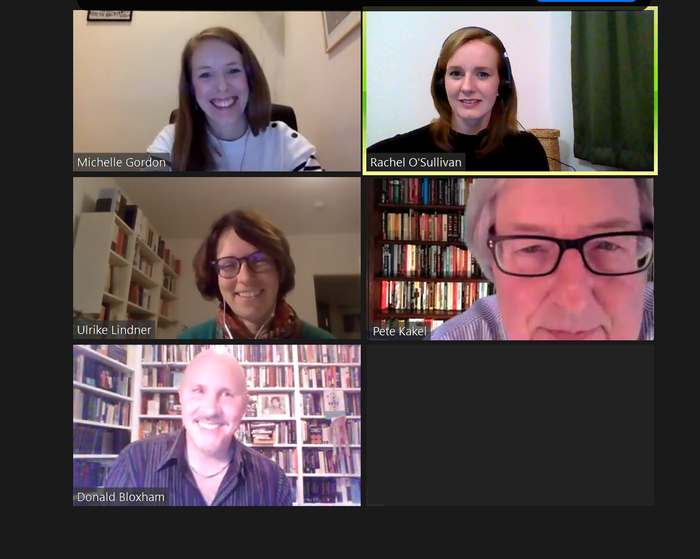- The Institute
- Research
- Dictatorships in the 20th Century
- Democracies and their Historical Self-Perceptions
- Transformations in Most Recent History
- International and Transnational Relations
- Edited Source Collections
- Dissertation Projects
- Completed Projects
- Dokumentation Obersalzberg
- Center for Holocaust Studies
- Berlin Center for Cold War Studies
- Publications
- Vierteljahrshefte
- The Archives
- Library
- Center for Holocaust Studies
- News
- Dates
- Press
- Recent Publications
- News from the Institute
- Topics
- Munich 1972
- Confronting Decline
- Feminist, Pacifist, Provocateur
- Der Mauerbau als Audiowalk
- Digital Contemporary History
- Transportation in Germany
- Envisaged Futures at the End of the Cold War
- From the Reichsbank to the Bundesbank
- German Federal Chancellery
- History of Sustainabilities: Discourses and Practices since the 1970s
- Changing Work
- Democratic Culture and the Nazi Past
- The History of the Treuhandanstalt
- Foreign Policy Documentation (AAPD)
- Dokumentation Obersalzberg
- Hitler, Mein Kampf. A Critical Edition
- "Man hört, man spricht"
Colonial Paradigms of Violence: Comparative Analysis of the Holocaust, Genocide and Mass Killing
Internationale digitale Konferenz (11. - 13. November 2020)
Please find the English version below
Vom 11. bis zum 13. November 2020 fand der englischsprachige digitale Workshop "Colonial Paradigms of Violence: Comparative Analysis of the Holocaust, Genocide and Mass Killing " statt, der vom Zentrum für Holocaust-Studien am Institut für Zeitgeschichte in München gemeinsam mit dem Hugo Valentin Centre der Universität Uppsala organisiert wurde. Michelle Gordon (Hugo Valentin Centre) eröffnete den Workshop indem sie in die komplexe historische Debatte über mögliche Vergleiche zwischen dem Holocaust und Fällen von kolonialer Gewalt und Völkermord einführte.
In den folgenden zwei Tagen setzten sich die Workshop-Teilnehmerinnen und -Teilnehmer in vier digitalen Panels kritisch damit auseinander, inwieweit ein koloniales Paradigma für die Holocaust-Geschichtsschreibung dienlich sein kann. Die Hauptfragen, auf die sich der Workshop konzentrierte, waren: Was waren die Verbindungen zwischen kolonialen Siedlerprojekten und Vertreibung und Mord, und wie kann dieses Thema in die Holocaust-Historiographie integriert werden? Was waren die Rollen und Motivationen von Tätern und Staat bei Eroberung, Besiedlung und Gewalt? Gab es praktische, ideologische oder rhetorische Überschneidungen zwischen dem Kolonialismus und dem Nationalsozialismus? Neben Holocaust-Forscherinnen und -Forschern nahmen auch Expertinnen und Experten aus dem Bereich der Kolonialgeschichte an dem Workshop teil und ermöglichten so faszinierende Einblicke in andere Forschungsbereiche und mögliche zukünftige Kooperationen.

Der Workshop endete mit der öffentlichen digitalen Podiumsdiskussion "Holocaust, Empire and Colonial Genocide", die die Hauptaspekte des Workshops miteinander verknüpfte. Rachel O'Sullivan (Zentrum für Holocaust-Studien) eröffnete die Diskussion mit einem Hinweis auf die Aktualität der Diskussion angesichts der jüngsten Aufrufe an ehemalige Imperien, den Umgang mit ihrer kolonialen und imperialen Geschichte neu zu überdenken. Sie wies auch auf die Notwendigkeit einer weiteren Integration des Themas koloniale und imperiale Gewalt in die Holocaust-Forschung hin. Die Podiumsteilnehmer, Ulrike Lindner (Universität Köln), Carroll P. Kakel (Johns Hopkins University) und Donald Bloxham (University of Edinburgh) reflektierten über die Stärken und Schwächen der Debatte und beleuchteten die Unterschiede in den nationalen Herangehensweisen in der Forschung und Bildung zum Holocaust im Vergleich zum Thema Kolonial- und Imperialgeschichte. Die Podiumsdiskussion fand große Beachtung; dank des digitalen Formats konnten fast 200 Personen aus verschiedenen internationalen Forschungseinrichtungen die Veranstaltung online verfolgen.
The English-language digital workshop “Colonial Paradigms of Violence: Comparative Analysis of the Holocaust, Genocide and Mass Killing,” jointly organized by the Center for Holocaust Studies at the Institute for Contemporary History Munich and the Hugo Valentin Centre, Uppsala University, was held from November 11 to 13, 2020. Michelle Gordon (Hugo Valentin Centre) opened the workshop with an introduction to the complexities of the debate on the potential comparisons between the Holocaust and instances of colonial violence and genocide.
In the following two days, the workshop participants critically dealt with the topic of the usefulness of the colonial paradigm to Holocaust historiography through four digital panels focusing on different elements of potential interconnections. The main questions the workshop focused on were: What were the links between settler colonial projects and displacement and murder, and how can this topic be integrated into Holocaust historiography? What were the roles and motivations of perpetrators and the state in incidents of conquest, settlement and violence? Were there practical, ideological or rhetorical crossovers between colonialism and the Nazi regime? As well as Holocaust historians, the workshop was also attended by experts working on colonial history and thus allowed for fascinating insights into other research spheres and potential future collaborations.
The workshop ended with a public digital panel discussion, titled “Holocaust, Empire and Colonial Genocide" which tied together the main workshop themes. Rachel O’Sullivan (Center for Holocaust Studies) opened the discussion by highlighting the timeliness of the discussion, given recent calls made to former empires to reassess approaches to their colonial and imperial history, and the need for further integration of the topic of colonial and imperial violence into Holocaust research. The panellists, Ulrike Lindner (University of Cologne), Carroll P. Kakel (Johns Hopkins University), and Donald Bloxham (University of Edinburgh), reflected on the strengths and weaknesses of the debate and the differing approaches to Holocaust remembrance and education and education on the topic of colonial and imperial violence. The Panel Discussion received much attention and, thanks to the digital platform, almost 200 people from a variety of international research institutions were able to view the event online.


